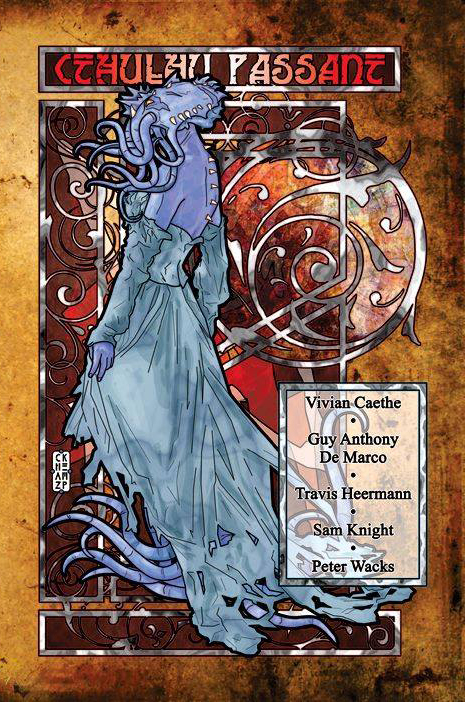A guest post by Guy Anthony De Marco.

A friend of mine, born and raised in Scotland, once complained about how the Scots are portrayed in books. “It’s not the characters, for the most part. It’s the way authors try to write with a brogue. To me, it makes Scotland look like a bunch of uneducated people mumbling under their breath.”
I never thought of it that way. I picked up some genre fiction that included heavy accents, and I had to agree.
In general, there are only two rules when portraying accents in literature. The first is the dialog must be done in a consistent manner. If a character says canna for can not, the words ‘can not’ shouldn’t appear when she talks. The only things that can change the way someone speaks is if there is some influence modifying the character, such as if the character is possessed, has multiple personalities, or, like Eliza Doolittle in My Fair Lady, they get training or adapt to the environment over a long period. Changing the way one speaks takes a lot of effort and time. I’m originally from Brooklyn, New York, and it took a few years to rid myself of the heavy Brooklyn accent. I still sometimes trip up and say “New Yawk” or “Gimme a cuppa cawfee, please.”
The second rule of accents, and one that tends to get bent, is the character must say things that the reader can translate. If it looks like the character accidently chewed up the words before spewing them, the reader may decide to pick up a different story to read. The line between legible and undecipherable can be thin, and it adjusts according to the reader. An author must balance the way a character speaks so the audience can extract the important elements necessary for the enjoyment of the story.
Some writers decide on a few words to give a particular character a recognizable speech characteristic. Others set up certain vowels or patterns to modify. Take, for example, Hagrid, from the Harry Potter series by J.K. Rowling, when he first tells the boy he’s a wizard:
“A wizard, o’ course,” said Hagrid, sitting back down on the sofa, which groaned and sank even lower, “an’ a thumpin’ good’un, I’d say, once yeh’ve been trained up a bit.”
In the example, Hagrid uses o’ for of, an’ for and, yeh for you, and words ending with ing are modified to in’. Ms. Rowling uses these speech patterns consistently, throughout all seven books. The rest of the words Hagrid speaks are spelled normally, in Standard English.
In Uncle Tom’s Cabin, by Harriet Beecher Stowe, the author uses accents to distinguish the characters and their class.
“Poor critturs! What made ’em cruel?–and, if I give out, I shall get used to ‘t, and grow, little by little, just like ’em! No, no, Missis! I’ve lost everything,–wife and children, and home, and a kind Mas’r,–and he would have set me free, if he’d only lived a week longer; I’ve lost everything in this world, and it’s clean gone, forever,–and now I can’t lose Heaven, too; no, I can’t get to be wicked, besides all!”
In this example, the author only uses a couple of dialog modifiers, but the effect is powerful, especially when compared to the way the slave owners speak. The sentences are stilted, but the reader can easily extract what the character is trying to say.
Look closely at both excerpts. Notice that the authors chose the most obvious speaking differences. The rest of the dialog appears ‘normal’. These speech characteristics give the characters flavor and life, and set them apart from the rest of the cast. Note that the respective authors did not try to force every spoken word to fit a particular speech pattern. Attempting to do so will result in inconsistencies and dialog that is difficult to comprehend, let alone translate.
One additional item to watch for is how the reader will react to your dialog. My Scottish friend refuses to read any novel that makes an accent look like an accident at the printing shop. An author should be aware of the sensibilities of the audience, especially beyond North American borders.
As my friend said, “It’s you Yanks who have the funny accents. We all talk normally in Edinburgh.”
References: Uncle Tom’s Cabin, by Harriet Beecher Stowe; W.W. Norton, 1st Edition, ISBN 978-0393963038
Harry Potter and the Philosopher’s Stone, by J. K. Rowling; Bloomsbury Children’s, ISBN 978-0747571667
 Guy Anthony De Marco is a speculative fiction author; a Graphic Novel Bram Stoker Award® finalist; winner of the HWA Silver Hammer Award; a prolific short story and flash fiction crafter; a novelist; an invisible man with superhero powers; a game writer (Sojourner Tales modules, Interface Zero 2.0 core team, D&D modules); and a coffee addict. One of these is false.A writer since 1977, Guy is a member of the following organizations: SFWA, WWA, SFPA, IAMTW, ASCAP, RMFW, NCW, HWA. He hopes to collect the rest of the letters of the alphabet one day. Additional information can be found at Wikipedia, GuyAndTonya.com, and GuyAnthonyDeMarco.com.
Guy Anthony De Marco is a speculative fiction author; a Graphic Novel Bram Stoker Award® finalist; winner of the HWA Silver Hammer Award; a prolific short story and flash fiction crafter; a novelist; an invisible man with superhero powers; a game writer (Sojourner Tales modules, Interface Zero 2.0 core team, D&D modules); and a coffee addict. One of these is false.A writer since 1977, Guy is a member of the following organizations: SFWA, WWA, SFPA, IAMTW, ASCAP, RMFW, NCW, HWA. He hopes to collect the rest of the letters of the alphabet one day. Additional information can be found at Wikipedia, GuyAndTonya.com, and GuyAnthonyDeMarco.com.
